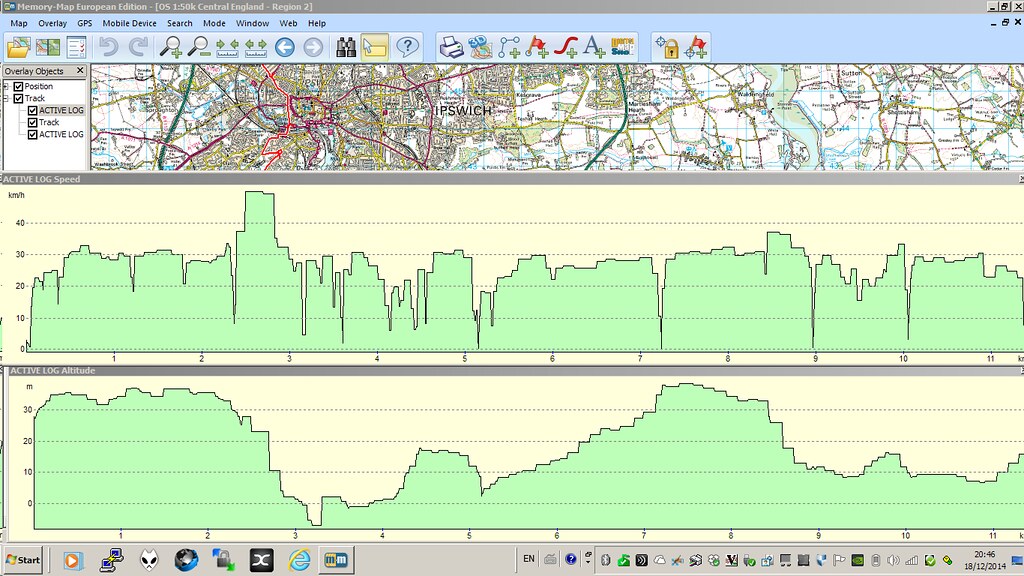for some months I have used liquidsoap on another VPS I rent (that also is the helpdesk for my employers; I resell part of this to them) to transcode my 192k mp3 stream to a 96k aac stream for mobile listening. (http://uk4.internet-radio.com:10936/mobile.m3u)
I usually listen to this when cycling to and from my work site in the rural areas (SW Ipswich to and from Mid Suffolk).
This is the speed and elevation profile of the 11km route (units are all in metric for easier compariso globally - I am also riding an e-bike; in case anyone wonders how I am getting around at that sort of speed at my age )
)

I use a Windows Phone (Nokia Lumia 930) on the t-mobile/EE network) which gives the best reception along this route. I have used other devices and O2/giffgaff but they do not work in the more rural area at the end of the journey.
Results have been acceptable sound quality wise - the main annoyance being that the whole stream cuts out when you go out of range of the 3/4G equipped base stations and it needs to be restarted from the phone screen. This can happen 3/4 times during the journey, usually at the points of large changes in altitude. Restarting the stream is not easy if you are wearing gloves and of course not safe if it affects your control of the bike (I did pay attention to road safety throughout these experiments!).
It seems all the players do this; which is most likely a limitation of the mobile networks.
Another limitation is that when a lot of other folk are using mobiles around you your stream may drop (I believe that voice calls are prioritised because of UK/EU rules over access to 999 / 112 ) - there does seem to be another "priority stream" used by the Emergency Services for their 3G devices but otherwise you get the same access as everyone else; its just the towers get overloaded.
Most of the time you can get "good reception" and listen for a fair few minutes - it takes about 1 megabyte out of a data bundle per minute but that is not too bad if you are only listening for about 20-40 minutes each day on a mobile device.
I certainly would not recommend trying to listen in a motor car (not even as a passenger); as the stream drops suddenly and the distraction of restarting the playback is going to be unsafe!
Perhaps things are better in big cities - and mobile radio is in its infancy. it would be interesting to hear others' experiences (remember to state what country, region and network you are using!)
I usually listen to this when cycling to and from my work site in the rural areas (SW Ipswich to and from Mid Suffolk).
This is the speed and elevation profile of the 11km route (units are all in metric for easier compariso globally - I am also riding an e-bike; in case anyone wonders how I am getting around at that sort of speed at my age

I use a Windows Phone (Nokia Lumia 930) on the t-mobile/EE network) which gives the best reception along this route. I have used other devices and O2/giffgaff but they do not work in the more rural area at the end of the journey.
Results have been acceptable sound quality wise - the main annoyance being that the whole stream cuts out when you go out of range of the 3/4G equipped base stations and it needs to be restarted from the phone screen. This can happen 3/4 times during the journey, usually at the points of large changes in altitude. Restarting the stream is not easy if you are wearing gloves and of course not safe if it affects your control of the bike (I did pay attention to road safety throughout these experiments!).
It seems all the players do this; which is most likely a limitation of the mobile networks.
Another limitation is that when a lot of other folk are using mobiles around you your stream may drop (I believe that voice calls are prioritised because of UK/EU rules over access to 999 / 112 ) - there does seem to be another "priority stream" used by the Emergency Services for their 3G devices but otherwise you get the same access as everyone else; its just the towers get overloaded.
Most of the time you can get "good reception" and listen for a fair few minutes - it takes about 1 megabyte out of a data bundle per minute but that is not too bad if you are only listening for about 20-40 minutes each day on a mobile device.
I certainly would not recommend trying to listen in a motor car (not even as a passenger); as the stream drops suddenly and the distraction of restarting the playback is going to be unsafe!
Perhaps things are better in big cities - and mobile radio is in its infancy. it would be interesting to hear others' experiences (remember to state what country, region and network you are using!)